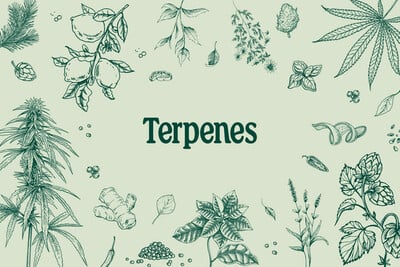.

How To Choose The Right CBD Oil For You
When it comes to CBD oil, it's fair to say they're not all created equal. However, you don't need to risk your hard-earned money on a product that isn't right for you, so it's best to get informed. Luckily, we've got all the knowledge you need to help you choose your perfect CBD oil. Follow along as we break down the main criteria.
Here's how to figure out which CBD oil is right for you.
Contents:
Cannabidiol, or CBD, has become a bit of a wellness craze over the past few years, with many brands and retailers eager to capitalise on the boom. While they were once rare, there are now more CBD oils than we know what to do with.
Some have started to infuse their products with the essence of rose and vanilla, while others have worked to mix in other cannabinoids like CBN and CBG to enhance the oil's scope of effects. Certain brands have even begun using liposomes and nanoemulsion to boost the efficacy of their CBD products.
But do all CBD oils do exactly what they claim? And how can you tell the difference between a legitimate CBD oil and an inauthentic alternative? There are a lot of factors that come into play when deciding which CBD oil is best for you. These factors, along with deceptive marketing, can make it very hard to actually pull the trigger and make a purchase.
In turn, we think everyone could benefit from a general guide on the ins and outs of being a discerning CBD oil customer.
FACTORS TO CONSIDER WHEN BUYING CBD OIL
The CBD industry is getting more regulated every year, but there’s still a long way to go. As a result, it’s worth noting that the quality and purity of CBD oils—and thus, their effectiveness—can vary greatly from one product to the next. So, how do you decide which to get? Let's take a look.
SPEAK WITH YOUR DOCTOR
When it comes to trying CBD oils for the first time, your doctor is your best friend. Regardless of the reason you’re taking it, CBD oil could have some cross-drug interactions you don’t know about. Therefore, a visit to the doctor is a must before starting a regular CBD regimen. After all, it’s their job to answer your questions when your health is at stake.
But what, exactly, could happen when CBD and another drug mix in your body? In short, CBD is broken down by the same family of enzymes as most prescription meds, forcing the substances to compete and interrupting their metabolism. This, in turn, could lead to some notable complications if introduced into your routine without a doctor's guidance.
Even if you live somewhere cannabis isn't legal, you should still speak to your doctor. Whether they're receptive to the idea of CBD or need to learn more, they can still help.
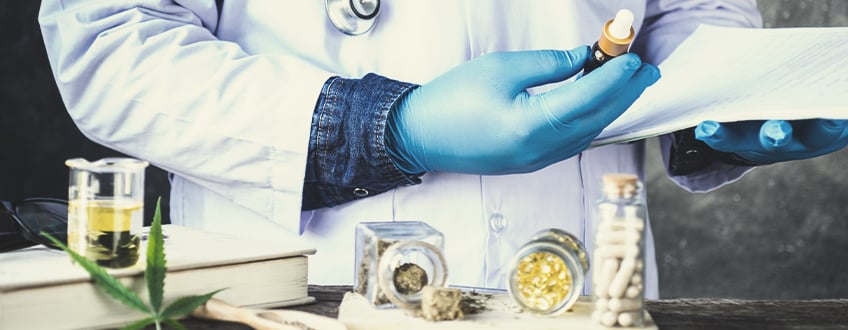
CHOOSE A SUITABLE CBD CONCENTRATION
CBD oil products come in a range of concentrations, meaning some contain higher doses of cannabidiol than others. In short, the higher the concentration, the more potent the effect.
Whether in capsule or dropper bottle form, all reputable CBD oils will display that information on the packaging. Some brands will list the amount of CBD in milligrams—for example, 250mg—while others specify the percentage—for example, 40% CBD. Either way, the higher the number, the more potent the concentration.
If you're new to CBD oils, we recommend starting with a low to moderate concentration. Then, you can gradually work your way up to higher doses if needed. No matter how you're using CBD, it's easier to increase your dose than it is to decrease it after the fact. Observe how it affects your body, and you’ll be better informed on how to adjust your dose in the future.
FULL-SPECTRUM CBD VS CBD ISOLATE
Full-spectrum CBD and CBD isolate are the most common types of CBD oil. Put simply, full-spectrum oils contain all of the active cannabinoids and terpenes found within hemp, while CBD isolates contain pure cannabidiol and nothing else.
Until recently, CBD isolate was considered an industry standard. However, full-spectrum oils have been found to offer a host of potential benefits. See, the compounds in cannabis are thought to build off each other in a theorised dynamic known as the entourage effect. According to this idea, cannabinoids and terpenes can boost or mediate each other's effects when they interact in the body.
Considering that, unless you’re adverse to the other compounds, or only need CBD for some other reason, we recommend full-spectrum CBD oils for first-time users. That being said, however, both types have their benefits, and CBD isolate is equally valid relative to its full-spectrum counterpart.
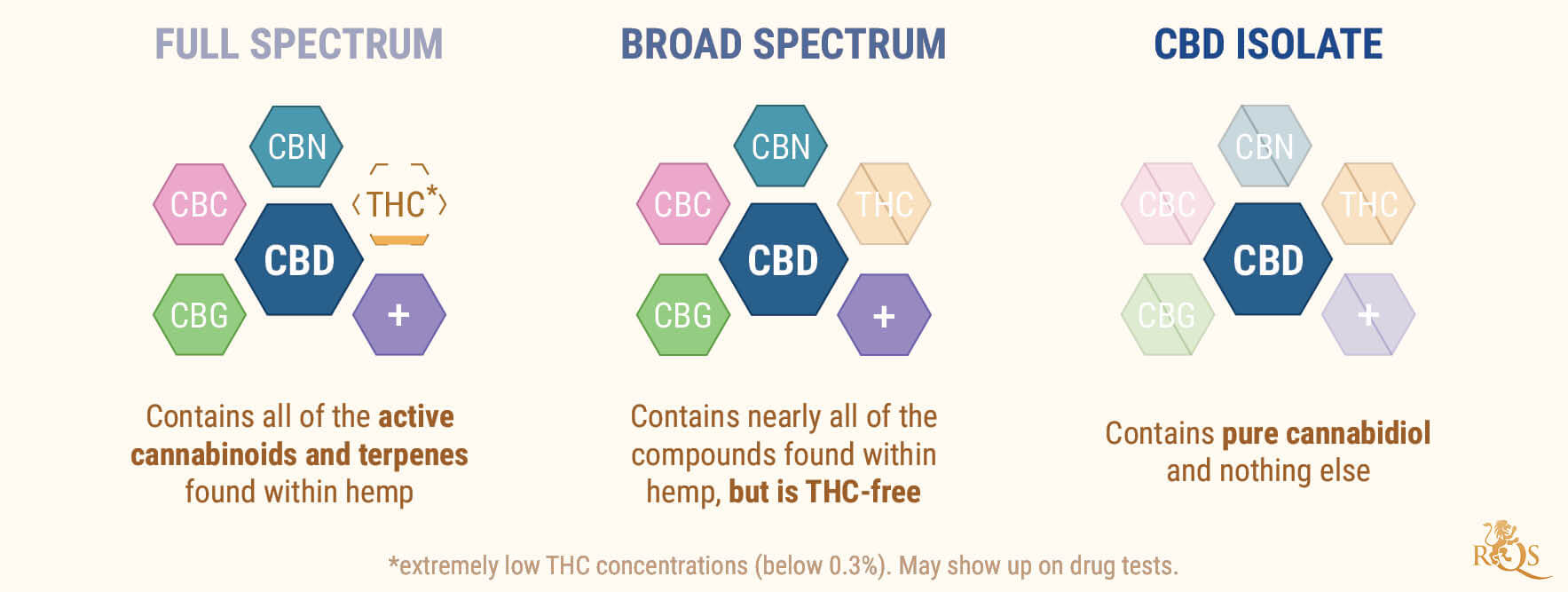

CBD OIL VS CAPSULES
Almost as important as choosing the right concentration, it’s also worth considering how you’ll be ingesting your CBD. Plenty of oils are available in dropper bottles and meant to be taken sublingually (under the tongue). However, you can also get CBD capsules or gummies, which offer discreet, controlled doses that are easy to administer and work similarly to vitamins.
These products contain the same active ingredients, regardless of delivery method. However, the onset and duration of effects may vary. To be specific, when you take CBD oil sublingually, the cannabinoid has a direct path into your bloodstream via the oral mucosa, and the amount you receive in your system relative to your dose (in other words, your absorption rate) is far higher than it would be with edibles.
That said, once the effects of edibles and capsules do come on, they last longer than if you took CBD under the tongue. As you can see, each method has benefits the other can’t offer. Capsules are covert, convenient, and exert longer-lasting effects, whereas sublingual intake offers a faster effect and better bioavailability. Basically, there's no right or wrong answer.
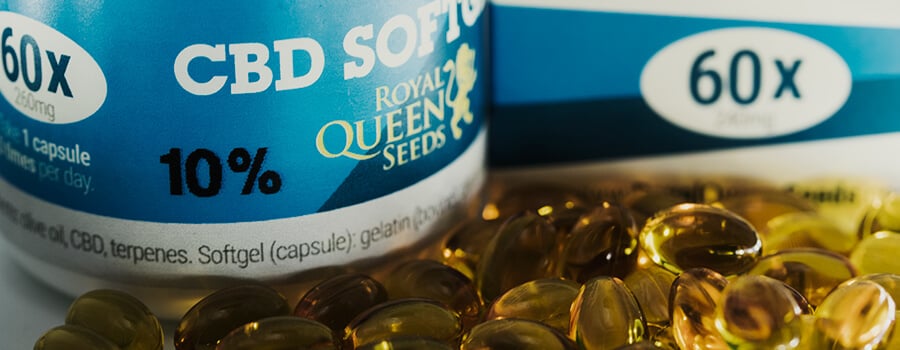
EXTRACTION METHOD
There are a variety of ways to extract CBD from the cannabis plant. That said, some methods offer a more pure and high-quality product. Some companies aim for quality as a priority, while others cut corners. While certain extraction processes are far cheaper than others, the savings aren't worth the risk of using inferior methods.
The best CBD oils are created via supercritical CO₂ extraction. This method uses carbon dioxide that’s been pressurised into a simultaneous liquid and gaseous state, acting to swiftly separate cannabinoids and terpenes from plant matter. Products made using this method are more expensive as a result, but you'll know you're getting quality for your money.
When looking at CBD oils, check to see if the method of extraction is listed on the packaging, or on the brand website. Reputable manufacturers are usually transparent about this. If the extraction method is nowhere to be found, you should be cautious before buying.
CARRIER OIL
Plant-derived carrier oils—also known as base oils—are used to help carry the active components of CBD oil into the body. Look into the different types of carrier oils popular manufacturers use. Two of the most common are hemp seed oil and olive oil, though there are plenty of others, including MCT (medium-chain triglyceride), grapeseed, sunflower, and avocado.
HEMP SEED OIL
Hemp seed oil is made by pressing hemp seeds to release their natural oil. Hemp seeds are considered a superfood, and are known to offer a comprehensive range of nutritional benefits.
As a carrier oil, hemp seed oil adds a distinctive taste to your CBD oil, which some might not like, but others will deeply enjoy. The fact that it comes from the same plant as the cannabinoids and terpenes within makes hemp seed oil an appropriate fit as well. It’s also worth noting, however, that some companies out there try to sell hemp seed oil as CBD oil, which is just plain lying.
OLIVE OIL
Olive oil has been a staple of Mediterranean cooking for centuries. Being rich in antioxidants, with a great ratio of saturated and unsaturated fats, it’s easy to see why it’s also one of the most popular carrier oils for cannabis oils, especially CBD oil.
CBD oils with olive oil as a carrier taste more mild than those with hemp seed. Olive oil also feels thicker than hemp seed oil, which might give it a heavier mouthfeel. If you’re familiar with the taste and texture of the former, however, it’ll be a much more recognisable and pleasant sensation than the hemp seed oil-based alternative.
MCT OIL
Plant oils are great, but an interesting alternative has started appearing over the past few years. Specifically, CBD oil manufacturers have found that MCT (medium-chain triglyceride) oil is one of the most effective mediums for delivering cannabinoids into your system.
See, MCTs are a type of fat composed of shorter molecules than those of most fats we enjoy (long-chain triglycerides [LCT]). This makes MCT far easier for our bodies to quickly absorb into our bloodstream. It also turns out that CBD and other cannabinoids cling right onto these molecules when they enter the system together. In turn, you'll enjoy more of the CBD when it's carried into your body by MCT oil.
COST
If you're on a budget, you’ll naturally need to take price into consideration. While CBD oils with higher concentrations may be more expensive, their potency also means they can last longer. As a result, they may cost less in the long-run. But, of course, it’s all about whether you’re able to put down more money at once.
Once you know how much oil you need to feel its effects, it might be worth looking into buying products with a higher concentration. For example, one 500mg bottle will cost less than two 250mg bottles of the same product.
Moreover, you might find two oils with the same concentration of CBD available at vastly different price points. Don't bother buying the cheapest product possible if it makes promises it can't back up. That doesn't mean you need to buy the most premium product either, but you should be judicious.
CHECK WHERE THE HEMP IS FROM
Organic or naturally grown EU hemp plants are undoubtedly the best raw material for CBD oil. Shadier CBD oil manufacturers—the same ones that cut corners when it comes to extraction—sometimes use hemp or cannabis grown in questionable conditions. This is bad because hemp absorbs harmful chemicals in the soil and air very easily.
To stay on the safe side, look for brands that reliably test their hemp. European hemp regulations are particularly strict, ensuring negligible levels of THC and high-quality harvests; but great hemp can be found worldwide.
To verify the quality of the hemp, you can look to the lab results of the CBD oil itself, as this should include a heavy metals analysis and a cannabinoid/terpene breakdown.
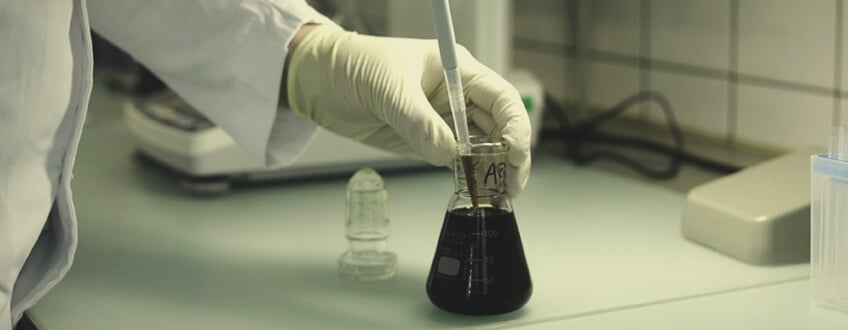
BRAND REPUTATION
Like most consumable products, brand reputation is key to weeding out the good CBD oils from the bad. A reputable CBD manufacturer will list all of the information you need to ascertain quality on their website (or as downloadable attachments).
Alongside lab results, extraction methods, carrier oils, and more, customer reviews are also extremely helpful. In addition to verifying the quality of the products, you can get an idea of a company's shipping times and costs, customer service, and history in the industry.
Some will mention the taste, others the quality or potency, and some might even amend their reviews if the brand reached out to deal with an issue.
Most of the best manufacturers will link to external review sites on their own website, so you know the feedback is coming from real customers. As a rule, we recommend checking independent platforms such as Trustpilot, Facebook, and Google to see what people have said about a particular brand.
CHOOSING THE RIGHT CBD OIL FOR YOU: DO YOUR DUE DILIGENCE
If you're looking to find the right CBD oil for you, scope out different companies and see what they have to offer. Check what's in your CBD oil, what methods they use to harness the cannabinoid in the first place, and whether or not they've got a good reputation. You have to account for your own needs, of course, and should consider other factors like your budget and optimal dose. Beyond that, it’s all down to personal preference.
- 🌱 How do you choose quality CBD oil?
- There are a few key criteria by which you can measure CBD oil quality. If the oil was sourced from organically grown hemp, processed using supercritical CO₂, and tested by a third-party lab, you should be in the clear.
- 👨🏻🔬 How do I choose a CBD brand?
- To choose the best CBD brand for you, you’ll have to start by doing some research. Generally, you’ll want to look for brands that independently test their products, and brands that offer comprehensive customer reviews.
- 🧬 What are the different types of CBD oil?
- There are several types of CBD oil. The three main categories are full-spectrum, broad-spectrum, and CBD isolate.
- 🍯 What’s the difference between CBD oil and CBD tincture?
- CBD oil is made by infusing cannabis in a carrier oil such as hemp seed, MCT, or olive. CBD tincture, on the other hand, is made by infusing cannabis in alcohol or glycerine.





























